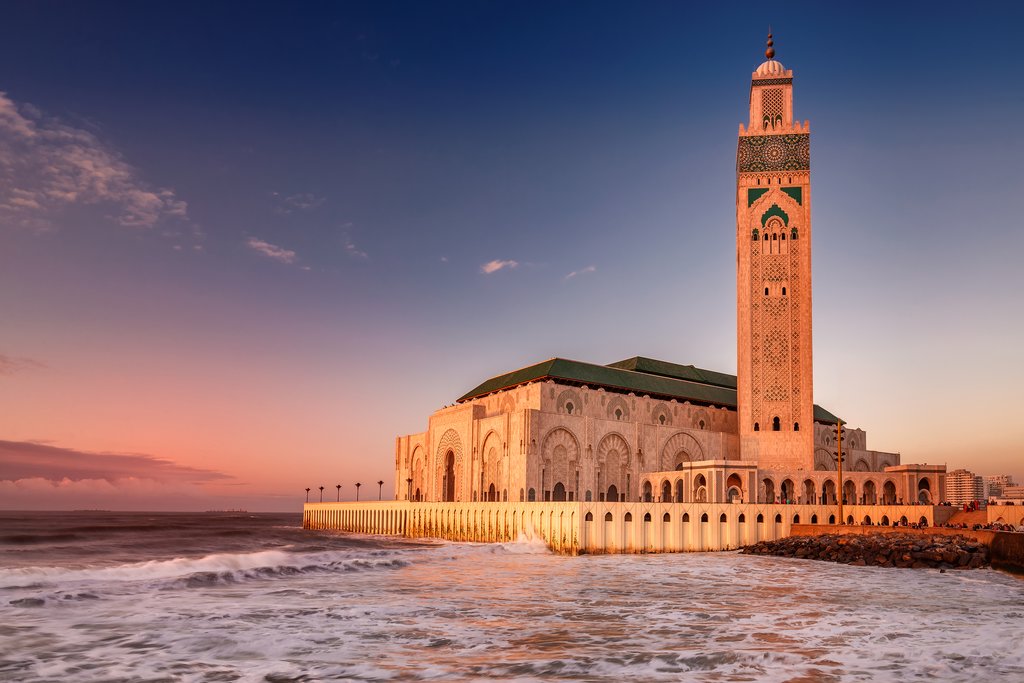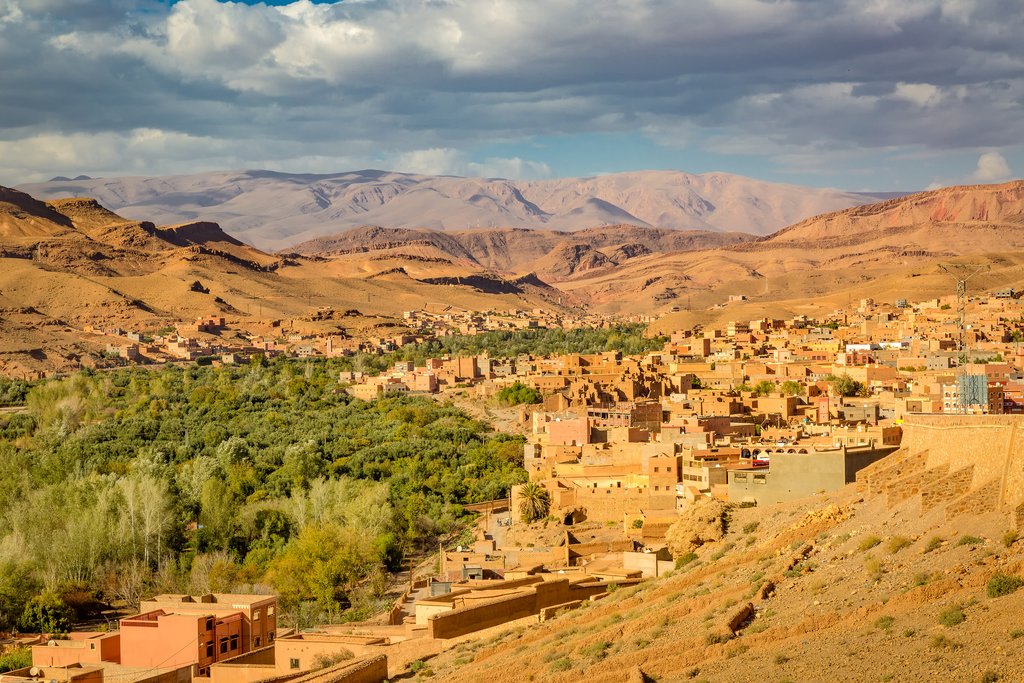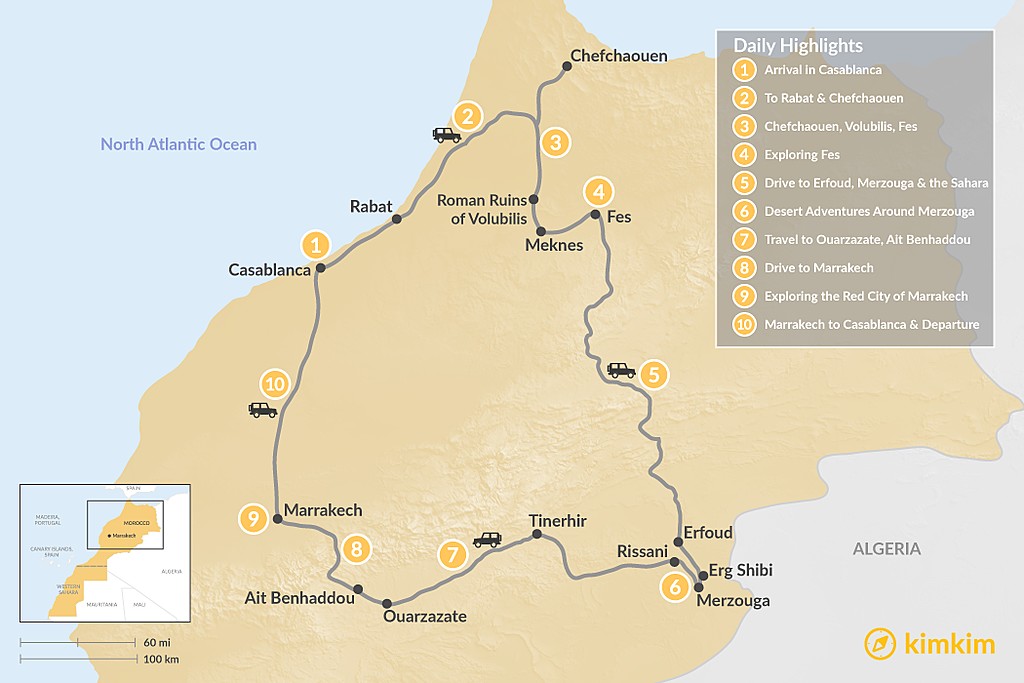Highlights
- Marvel at the intricate craftsmanship of the Hassan II Mosque
- Roam the brilliant blue streets of Chefchaouen
- Compare all four imperial cities: Rabat, Meknes, Fes, and Marrakech
- Sleep under a veil of stars in an elegant Bedouin-style tent in the Sahara
Brief Itinerary
| Day | Highlights | Overnight |
|---|---|---|
| Day 1 | Arrive; Casablanca | Casablanca |
| Day 2 | To Rabat and Chefchaouen | Chefchaouen |
| Day 3 | Chefchaouen, Roman ruins of Volubilis; Meknes and Fes | Fes |
| Day 4 | Fes: Exploring the Imperial City and medieval medina | Fes |
| Day 5 | Over the Middle Atlas to the Desert: Erfoud, Merzouga, Sahara | Merzouga |
| Day 6 | Desert towns around Merzouga, lush oases, and Todra Gorge | Todra Gorge |
| Day 7 | Dades Valley, Ouarzazate, Aït Benhaddou | Aït Benhaddou |
| Day 8 | Aït Benhaddou, Tizi n'Tichka Pass over the High Atlas; Marrakech | Marrakech |
| Day 9 | Marrakech: Exploring the Red City | Marrakech |
| Day 10 | Marrakech to Casablanca; depart |
Detailed Itinerary
Day 1: Casablanca

Welcome to Morocco's west coast! Welcome to Casablanca. The largest city in Morocco, Casablanca is a modern city with major French influence. An architectural treat, visit the popular Hassan II Mosque and admire its exquisite craftsmanship. Sitting pretty on an outcrop over the Atlantic Ocean, the Hassan II Mosque is estimated to house 25,000 worshippers inside with additional room for 80,000 in its courtyard. Unique to Morocco, Hassan II is one of few mosques where non-Muslims are permitted to enter. Feast your eyes on the intricate marble work, wood and stone carving, and gilded cedar ceilings.
Explore Parc de la Ligue Arabe and check out the Casablanca Cathedral (no longer in use) for a fine example of mid-19th-century Mauresque architecture (a mix of European art deco and Moorish style). Visit the Old Medina (old quarter), the only part of the city pre-dating the French protectorate, before touring the Hobous, or new medina. Built in the 1930s by the French, Hobous is a great place to seek out olive, vegetable, and spice markets, as well as admire more examples of Mauresque buildings. Take a stroll along the Boulevard de la Corniche, often referred to as the "Miami of Morocco."
Day 2: To Rabat and Chefchaouen

Continue north to the imperial city and present-day capital of Rabat, a bustling city with rich history. Explore the medieval fortification of the Chellah Necropolis in the heart of Rabat and explore its Roman and Islamic ruins. Find the Kasbah Des Oudaias, a grand door that leads to Rabat's original city center, and quietly wander the peaceful white and blue-washed streets. Visit the 20th-century Andalusian Gardens before discovering the Hassan Tower, a minaret of the incomplete mosque and Mausoleum of Mohamed V, a 12th-century project that was abandoned shortly after construction.
Carry on northward and watch the landscape change from flat plains and rolling hills to the rocky terrain of the Rif Mountains. Known as the "Blue City," Chefchaouen is made up of narrow, winding streets and blue-washed buildings, enjoy the relaxed atmosphere and friendly locals. Spend your time in the compact medina along the northern hillside and enjoy a meal in Plaza Outa el Hammam, before touring the kasbah (old fortification). As the day draws to an end, make your way to the abandoned Spanish Mosque to enjoy one last view over Chefchaouen as the sun sets behind the mountains.
Day 3: Roman Ruins of Volubilis and imperial cities of Meknes and Fes

Rise early to snap unobstructed photos before you head out to the Roman city of Volubilis. A UNESCO protected site, Volubilis is home to Morocco's best preserved Roman ruins. Wander the expansive complex, exploring the still-intact columns of former buildings, large merchant homes, temples, and the colorful mosaics, including the Labors of Hercules.
Continue south to your second imperial city, Meknes. Spend a little time exploring Ville Impériale (Imperial City) and the medina. Be sure to check out the grand Bab al-Mansour gate and the Mausoleum of Moulay Ismail.
Carry on eastward to Fes. Before venturing into the medina, take the time to complete a short trek up a hill to the ruins of the Merenid Tombs for a panoramic view of the medieval city. The best time to visit the tombs is around dusk. The muezzin's calls to worship can be heard through the valley as the city lights begin to glow on, adding to the atmosphere. Or, for another vantage point, find your way to the Mellah (old Jewish quarter and cemetery) in Fes el Jdid. Return to your traditional riad for a warm meal.
Day 4: Fes: Exploring the Imperial City and medieval Medina

The oldest of the imperial cities in Morocco, and perhaps the most interesting and exciting to explore, Fes has undergone little colonial development adding to its medieval appeal. The most complete medina in the Arab world and a UNESCO World Heritage site, Fes is made up of three main points of interest: Fes el Bali (old Fes, the medina, and where you will spend most of your time), Fes el Jdid ('new' Fes), and the French-influenced Ville Nouvelle. Meet your guide to learn more about the history and culture of Fes, and most importantly, to help you navigate the medina.
Begin your tour in Fes el Bali, starting at the Bab Boujeloud gate welcoming you onto Talâa Kebira. Discover the wares for sale in the souks (markets) and shops as you pass the Spanish and Tunisian influenced architecture. One of the most unique sights in the old Medina is the tanneries and Chouara Tannery is no exception.
Climb to the rooftop of a nearby leather shop for a better view of the 11th-century stone pots filled with dye and men working. Follow your guide to Al-Qarawiyyin Library and Mosque (859 CE). If you're lucky, you may be able to sneak a peek inside the Library.
Chat with a local specialist who can help organize your trip.
Day 5: Into the desert: Erfoud, Merzouga and the Sahara

You'll be covering a lot of ground today as you work your way south toward your final destination outside the desert town of Merzouga. Ascend the Middle Atlas mountains through fragrant cedar forests, and over the Col du Zad pass. Stop and stretch your legs in the "Apple City" of Midelt—known for its fruit orchards—and lunch near the Moulouya River. Continue to the palm forests of the Ziz Valley by way of the Tizi n'Talremt pass, noting the many fortified ksars merchants built to protect and stock their precious goods (gold, salt, and spices).
Reach Erfoud, known for dates and fossils, and stop at a local artisan collective to learn everything there is to know about the types of fossils found in the area. Head toward the sea of sand of Erg Chebbi, where some dunes are more than 600 feet tall. In Merzouga, meet your camel and hop aboard to trek to your evening's accommodation: a Bedouin-style tent. Race to the top of a nearby sand dune to watch the desert sunset over the dunes before returning to your site for dinner and a campfire under the starry night sky.
Day 6: Desert towns around Merzouga, lush oases, and Todra Gorge

Wake early to catch the rising sun before readying yourself to go sand boarding. You will also have the option of joining an ATV tour or the Erg Chebbi (sand dune) tour. Or, if you prefer lounging poolside in Merzouga, this can be arranged.
Leave the dunes behind and discover the traditional Saharan village of Khemliya—its people originally from Mali. Experience traditional music, drumming and dancing before taking a light walk around the village and its farmed plots in the sand. From there, visit the market town of Rissani to explore the live animal auction and nearby 'donkey parking lot'. Continue west to Tinerhir and admire the extensive stretch of oasis and the community of buildings that follow the greenery. Stop at the Todra Gorge and climb down to the water's edge to relax in the refreshing water of the Todra River.
Day 7: Dades Valley, Ouarzazate, and Aït Benhaddou

Your journey continues west along the Valley of a Thousand Kasbahs, many in disrepair having been made of pisé clay (rammed earth). Make your way through Boumalne Dades until you reach the plots of land, bordered by manicured rose bushes, in Kela'a M'gouna. Used in the cosmetics industry, roses are cultivated to make rose water and rose oil.
Continue west to the popular desert hub and filming location, Ouarzazate. Join a movie studio tour and discover which of your favorite movies were filmed in the nearby desert regions. Movie buffs may appreciate a visit to the Musée du Cinema.
Reach today's final destination, the Kasbah of Aït Benhaddou—a fortified pisé village that sits in a valley near the foothills of the Atlas mountains. The most famous kasbah in Morocco and a protected UNESCO site, Aït Benhaddou held an important position along the trans-Saharan trade route between the southern desert and Marrakech and Ouarzazate.
Climb up to the old Granary for a view of the surrounding ksours (individual kasbahs) and Ouarzazate Valley. Wander the narrow alleys and passageways and if you so choose, pay a nominal fee to enter one or two of the old kasbahs.
Day 8: Tizi n'Tichka Pass over the High Atlas mountains to Marrakech

Your journey continues northwest, ascending the High Atlas mountains and through the Tizi n'Tichka pass. Stop near the top of the pass to enjoy the vista and the highest peak, Mount Toubkal at 13,671 feet (4,167 m). From there, visit Taddert to tour an argan oil cooperative and discover how the nuts are processed to extract the precious oil used in the health and beauty industries. As you continue to descend the north side of the mountain range, notice the dramatic change in climate and scenery: from arid and barren to humid and verdant.
Upon arriving in Marrakech, settle into your hotel, before venturing out to Marrakech's main square, Jemaa el-Fna. The square comes alive in the early evening with vendors, musicians, artists, and performers, including snake charmers! Wander the many stalls and begin to orient yourself around the square: the souks are to the north, the Koutoubia Mosque and Gardens to the west and the kasbah area with the Saadian Tombs, Bahia Palace, and El Badi Palace are to the south. Find a quieter café near the square to enjoy a meal and watch the spectacle unfold before you.
Day 9: Marrakech: Exploring the Red City

Unlike Fes, Marrakech has Berber rather than Arab roots and today remains a major economic center. Founded in the 11th century, it is often referred to as the "Red City” due to the natural red pigment found in its walls and buildings. Meet your guide and discover the hidden gems of the medina: souks and shops selling their wares.
Find your way to the Koutoubia Mosque—Marrakech's tallest minaret at 253 feet (77 m)! Next, visit the 16th-century Ben Youssef Madrasa Islamic school and marvel at the exquisite Moroccan artisanship: arabesques, Islamic calligraphy, and colorful geometric tile work.
Visit the Majorelle Gardens in Ville Nouvelle for a place to escape the afternoon heat. Next, check out the Saadian Tombs, only discovered in the 1930s. From there, visit the 19th-century Bahia Palace, the most luxurious palace of its time, and admire the intricate woodwork and painted ceilings.
If there's time, visit the El Badi Palace and its sunken gardens, before heading to Marrakech's Mellah. As you return to Jemaa el-Fna, note the large open spaces along the alleyways, these fondouks or caravanserai were once inns along the ancient trade routes providing travelers and traders a place to stay.
Day 10: Return to Casablanca

Rise early and complete any last minute gift and souvenir shopping before finding the 12th-century Almoravid Koubba. The only surviving Almoravid monument, the Koubba was rediscovered in 1948. Next, visit the Marrakech Museum. Housed in the 19th-century Moorish Dar Mnebbi Palace, the museum offers a collection of modern and traditional art, including artifacts of Berber, Moroccan Jewish and Islamic cultures. If there's time, you may wish to visit the Museum of Moroccan Arts (also referred to as the Dar Si Said Museum), known for its extensive woodwork collection.
After lunch, begin the return trip to Casablanca (about 3.5 hours). Stop for a quick drink at Rick's Café—a popular restaurant and bar influenced by the movie Casablanca before catching your return flight to your next destination.








